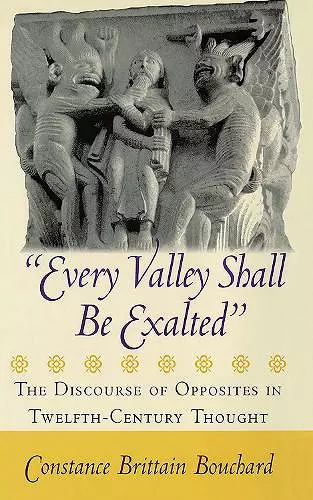"Every Valley Shall Be Exalted"
The Discourse of Opposites in Twelfth-Century Thought
Constance Brittain Bouchard author
Format:Paperback
Publisher:Cornell University Press
Published:31st May '17
Currently unavailable, and unfortunately no date known when it will be back
This paperback is available in another edition too:
- Hardback£46.00(9780801440588)

In high medieval France, men and women saw the world around them as the product of tensions between opposites. Imbued with a Christian culture in which a penniless preacher was also the King of Kings and the last were expected to be first, twelfth-century thinkers brought order to their lives through the creation of opposing categories. In a highly original work, Constance Brittain Bouchard examines this poorly understood component of twelfth-century thought, one responsible, in her view, for the fundamental strangeness of that culture to modern thinking.
Scholars have long recognized that dialectical reasoning was the basic approach to philosophical, legal, and theological matters in the high Middle Ages. Bouchard argues that this way of thinking and categorizing—which she terms a "discourse of opposites"—permeated all aspects of medieval thought. She rejects suggestions that it was the result of imprecision, and provides evidence that people of that era sought not to reconcile opposing categories but rather to maintain them.
Bouchard scrutinizes the medieval use of opposites in five broad areas: scholasticism, romance, legal disputes, conversion, and the construction of gender. Drawing on research in a series of previously unedited charters and the earliest glossa manuscripts, she demonstrates that this method of constructing reality was a constitutive element of the thought of the period.
Bouchard's interdisciplinary approach must not only be applauded but imitated.... Bouchard reminds us that medieval thinkers were brilliant minds that were attached to bodies, and that means they were grounded in the culture of the Middle Ages. It might be neater to consider the more pristine world of ideas, but we must never forget that those ideas were discovered and debated in cathedral or university classrooms strewn with straw upon which embodied students sat. The master and the student alike were swayed by cultural elements that were not so esoteric, as much as they persuaded their contemporaries. That relationship should always seep into our interpretation of medieval culture.
-- James Ginther, St. Louis University * The Medieval Review *Professor Bouchard has provided a lively and competent study of an important aspect of medieval thought: the tension of opposites that so often dominated that difficult abstraction, 'the medieval mind'. Her interest is to introduce the reader to how writers of the twelfth century, and specifically in France, saw and interpreted the reality they experienced, but Bouchard has gone beyond this to provide an excellent introduction, by using case analysis, to the medieval mind in general.... In all, this is an excellent book. All interested in medieval studies, the interaction of religious thinkers with the questions and issues of their day, as well as the methodology of a different time, and not least our contemporary students who are so ingrained with the modern disjunctive mode of thinking would do well to ponder this clear exposition of the conjunctive frame whose complexity Bouchard so aptly reveals.
-- Thomas E. Morrissey, SUNY Fredonia * Church History: Studies in Christianity and CultuISBN: 9781501713644
Dimensions: 229mm x 152mm x 14mm
Weight: 454g
192 pages